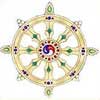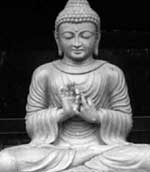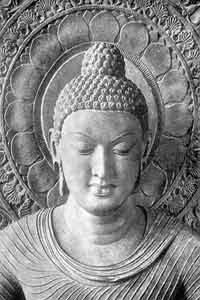free men
فريق العمـــــل *****

التوقيع : 
عدد الرسائل : 1500
الموقع : center d enfer
تاريخ التسجيل : 26/10/2009
وســــــــــام النشــــــــــــــاط : 6
 | |  Ancient Eastern Philosophy Ancient Eastern Philosophy | |
[size=50]Ancient Eastern Philosophy
On the Ancient Wisdom of Buddhism, Hinduism, Taoism & Confucianism[/size]  The most important characteristic of the Eastern world view - one could almost say the essence of it - is the awareness of the unity and mutual interrelation of all things and events, the experience of all phenomena in the world as manifestations of a basic oneness. All things are seen as interdependent and inseparable parts of this cosmic whole; as different manifestations of the same ultimate reality. The most important characteristic of the Eastern world view - one could almost say the essence of it - is the awareness of the unity and mutual interrelation of all things and events, the experience of all phenomena in the world as manifestations of a basic oneness. All things are seen as interdependent and inseparable parts of this cosmic whole; as different manifestations of the same ultimate reality.
(Fritjof Capra,The Tao of Physics) The fundamental element of the cosmos is Space. Space is the all-embracing principle of higher unity. Nothing can exist without Space. .. According to ancient Indian tradition the Universe reveals itself in two fundamental properties: as Motion and as that in which motion takes place, namely Space. This Space is called Akasa .. derived from the root kas, 'to radiate, to shine', and has therefore the meaning of ether which is conceived as the medium of movement. The principle of movement, however, is Prana, the breath of life, the all-powerful, all-pervading rhythm of the universe. (Lama Anagarika Govinda, 1969) The fundamental element of the cosmos is Space. Space is the all-embracing principle of higher unity. Nothing can exist without Space. .. According to ancient Indian tradition the Universe reveals itself in two fundamental properties: as Motion and as that in which motion takes place, namely Space. This Space is called Akasa .. derived from the root kas, 'to radiate, to shine', and has therefore the meaning of ether which is conceived as the medium of movement. The principle of movement, however, is Prana, the breath of life, the all-powerful, all-pervading rhythm of the universe. (Lama Anagarika Govinda, 1969)
[size=35]Buddhism
On the Life of Buddha, Buddhist Thought & Practice[/size] Buddhism is a moral philosophy / religion based upon the teachings of Siddhartha Gautama (566 - 486 B.C.). Buddhism is a moral philosophy / religion based upon the teachings of Siddhartha Gautama (566 - 486 B.C.).
Siddhartha Gautama became known as the Buddha. 'Buddha' (from the ancient Indian languages of Pali and Sanskrit) means "one who has awakened". It is derived from the verbal root "budh", meaning "to awaken" or "to be enlightened", and "to comprehend".The Buddha offered metaphysical knowledge into the nature of reality as well as a moral way of life. The Middle Way is an important idea in Buddhist thought and practice. To seek moderation and avoid the extremes of self-indulgence and self-mortification.At the age of 35, meditating under a Bodhi tree, Siddhartha reached Enlightenment, awakening to the true nature of reality, which is Nirvana (Absolute Truth);The dustless and stainless Eye of Truth (Dhamma-cakkhu) has arisen.
He has seen Truth, has attained Truth, has known Truth, has penetrated into Truth, has crossed over doubt, is without wavering.
Thus with right wisdom he sees it as it is (yatha bhutam) ... The Absolute Truth is Nibbana, which is Reality. (Buddha, from the Dhatuvibhanga-sutta (No. 140) of the Majjhima-nikaya)The Buddha taught that the nature of reality was impermanent and interconnected. We suffer in life because of our desire to transient things. Liberation from suffering may come by training the mind and acting according to the laws of karma (cause and effect) i.e. with right action, good things will come to you. This teaching is known as the Four Noble Truths: Dukkha: Suffering is everywhere Dukkha: Suffering is everywhere
Samudaya: There is a cause of suffering, which is attachment or misplaced desire (tanha) rooted in ignorance.
Nirodha: There is an end of suffering, which is Nirvana (the possibility of liberation exists for everyone).
Maggo: There is a path that leads out of suffering, known as the Noble Eightfold Path (right view, right thought, right speech, right conduct, right vocation, right effort, right attention and right concentration).The following quotes (from Buddha and others) express some of the main ideas of Buddhism; I will teach you the Truth and the Path leading to the Truth. (Buddha)It is proper for you to doubt .. do not go upon report .. do not go upon tradition..do not go upon hearsay..' (Buddha, Kalama Sutra) I will teach you the Truth and the Path leading to the Truth. (Buddha)It is proper for you to doubt .. do not go upon report .. do not go upon tradition..do not go upon hearsay..' (Buddha, Kalama Sutra)O Brahmana, it is just like a mountain river, flowing far and swift, taking everything along with it; there is no moment, no instant, no second when it stops flowing, but it goes on flowing and continuing. So Brahmana, is human life, like a mountain river. (Buddha) ‘Wherefore, brethren, thus must ye train yourselves : Liberation of the will through love will develop, we will often practice it, we will make it vehicle and base, take our stand upon it, store it up, thoroughly set it going.’ (Buddha) From The Dhammapada; Not to do any evil, to cultivate the good, to purify one’s mind, this is the Teaching of the Buddhas.To speak no ill will, to do no harm, to practice self-restraint according to the fundamental precepts, to be moderate in eating, to live in seclusion, to devote oneself to higher consciousness, this is the Teaching of the Buddhas.By endeavour, diligence, discipline and self-mastery, let the wise person make (of himself) an island that no flood can overwhelm.All (mental) states have mind as their forerunner, mind is their chief, and they are mind-made. If one speaks or acts with a defiled mind, then suffering follows ..Hatred is never appeased by hatred in this world; it is appeased by love. This is an eternal Law.Hard to restrain, unstable is this mind; it flits wherever it lists. Good is it to control the mind. A controlled mind brings happiness.'All conditioned things are impermanent’, when one sees this in wisdom, then one becomes dispassionate towards the painful. This is the Path to Purity. Not to do any evil, to cultivate the good, to purify one’s mind, this is the Teaching of the Buddhas.To speak no ill will, to do no harm, to practice self-restraint according to the fundamental precepts, to be moderate in eating, to live in seclusion, to devote oneself to higher consciousness, this is the Teaching of the Buddhas.By endeavour, diligence, discipline and self-mastery, let the wise person make (of himself) an island that no flood can overwhelm.All (mental) states have mind as their forerunner, mind is their chief, and they are mind-made. If one speaks or acts with a defiled mind, then suffering follows ..Hatred is never appeased by hatred in this world; it is appeased by love. This is an eternal Law.Hard to restrain, unstable is this mind; it flits wherever it lists. Good is it to control the mind. A controlled mind brings happiness.'All conditioned things are impermanent’, when one sees this in wisdom, then one becomes dispassionate towards the painful. This is the Path to Purity. Buddhism recognizes that humans have a measure of freedom of moral choice, and Buddhist practice has essentially to do with acquiring the freedom to choose as one ought to choose with truth: that is of acquiring a freedom from the passions and desires that impel us to distraction and poor decisions. (Walpola Rahula, What the Buddha Taught)Buddhism stands unique in the history of human thought in denying the existence of such a Soul, Self, or Atman. According to the teaching of the Buddha, the idea of self is imaginary, false belief which has no corresponding reality, and it produces harmful thoughts of ‘me’ and ‘mine’, selfish desire, craving, attachment, hatred, ill-will, conceit, pride, egoism, and other defilements, impurities and problems. It is the source of all the troubles in the world from personal conflicts to wars between nations. (Rahula)The theory of karma is the theory of cause and effect, of action and reaction; it is a natural law, which has nothing to do with the idea of justice or reward and punishment. Every volitional action produces its effects or results. If a good action produces good effects, it is not justice, or reward, meted out by anybody or any power sitting in judgement of your action, but this is in virtue of its own nature, its own law. (Rahula)For the first time in the history of the world, Buddhism proclaimed a salvation which each individual could gain from him or herself, in this world, during this life, without any least reference to God, or to gods either great or small. (Aldous Huxley)See our webpage Buddha Nirvana / Buddhism Religion for more pictures, information and quotes on Karma, Truth, the Dynamic Unity of Reality, Buddha's conception of Mind and Matter, The Four Noble Truths and the Eightfold Path, Anatta (No Soul) and Conditioned Genesis (Paticca-samuppada). Buddhism recognizes that humans have a measure of freedom of moral choice, and Buddhist practice has essentially to do with acquiring the freedom to choose as one ought to choose with truth: that is of acquiring a freedom from the passions and desires that impel us to distraction and poor decisions. (Walpola Rahula, What the Buddha Taught)Buddhism stands unique in the history of human thought in denying the existence of such a Soul, Self, or Atman. According to the teaching of the Buddha, the idea of self is imaginary, false belief which has no corresponding reality, and it produces harmful thoughts of ‘me’ and ‘mine’, selfish desire, craving, attachment, hatred, ill-will, conceit, pride, egoism, and other defilements, impurities and problems. It is the source of all the troubles in the world from personal conflicts to wars between nations. (Rahula)The theory of karma is the theory of cause and effect, of action and reaction; it is a natural law, which has nothing to do with the idea of justice or reward and punishment. Every volitional action produces its effects or results. If a good action produces good effects, it is not justice, or reward, meted out by anybody or any power sitting in judgement of your action, but this is in virtue of its own nature, its own law. (Rahula)For the first time in the history of the world, Buddhism proclaimed a salvation which each individual could gain from him or herself, in this world, during this life, without any least reference to God, or to gods either great or small. (Aldous Huxley)See our webpage Buddha Nirvana / Buddhism Religion for more pictures, information and quotes on Karma, Truth, the Dynamic Unity of Reality, Buddha's conception of Mind and Matter, The Four Noble Truths and the Eightfold Path, Anatta (No Soul) and Conditioned Genesis (Paticca-samuppada). | |
|


